ABSTRACT
The aim of this project is to designing nodes for the agricultural information monitoring using wireless networks using ZigBee and GSM
PURPOSE:
Now a day for agriculture we are not yet started using advance technologies to monitor different parameters like temperature and soil etc. Due to that farmers are facing so many problems. To avoid those things we are implementing a project which will work automatically. The purpose of this project is to improve the irrigation system of Indian agriculture and also to provide adequate irrigation to particular area.
PROJECT DESCRIPTION:
Objective:
Primarily of agricultural environment for social modernization of Indian agricultural system. In our project, we are basically concentrating on following applications such as:
- To continuously monitor the soil moisture.
- To continuously monitor the water level of well.
- To check the temperature, humidity and dew point so as to forecast the weather condition.
- To monitor & control the whole system through GSM module.
- Provide the detail information about the field condition to the user through SMS.
- Maintain faithful irrigation of the farm field
A developed sensor node, which can monitor soil temperature, is designed through modular design method. The hardware of sensor node is base on a ARM7 micro-controller and LM35 temperature sensor. The software system includes the temperature collection, information transmission, and the communication between two nodes. The node can collect soil temperature information and then send it to upper network node. The designed node possesses compact structure, stable performance, and small volume. This study provide better hardware platform for further researching the communication protocols of wireless sensor networks.
Wireless sensor network technologies have enabled sensor nodes to be deployed in quantity to gather environmental parameters and to detect certain events by using inexpensive micro controllers and low-cost RF hardware. They advocate the deployment of a WSN in agriculture because of its small size, low fixed cost and simplicity of wiring. This involves monitoring soil, crop and climate conditions in a field, generalizing the result and providing a decision support system for treatments or taking differential action such as real time variation of fertilizer or pesticide application.
The user communicates with the centralized unit through SMS. The centralized unit communicates with the system through SMS which will be received by the GSM with the help of the SIM card. The GSM sends this data to ARM7. ARM7 also continuously receives the data from sensors in some form of codes. After processing, this data is displayed on the LCD. The communication between various devices takes place through RS232.
A newly developed smart sensor node that can monitor the soil temperature in precision agriculture is researched in detail in this paper. The node hardware consists of temperature sensor module, microprocessor module, digital data transmission module and energy model. This design uses the microprocessor module and digital data transmission module, which could simply design RF circuit. The sensor module uses digital temperature sensor LM35.
POWER SUPPLY:
BLOCK DIAGRAM:
OUTPUT WINDOW:
Technology:
GSM:
GSM (Global System for Mobile communications) is the technology that underpins most of the world’s mobile phone networks. The GSM platform is a hugely successful wireless technology and an unprecedented story of global achievement and cooperation. GSM has become the world’s fastest growing communications technology of all time and the leading global mobile standard, spanning 218 countries. GSM is an open, digital cellular technology used for transmitting mobile voice and data services. GSM operates in the 900MHz and 1.8GHz bands GSM supports data transfer speeds of up to 9.6 kbps, allowing the transmission of basic data services such as SMS.
ZIGBEE:
Zigbee is new wireless technology guided by IEEE 802.15.4 Personal Area Network standard. It is primarily designed for the wide range controlling applications and to replace the existing non-standard technologies. It currently operates in 868 MHz band at a data rate of 20Kbps in Europe, 914MHz band at 40kbps in USA, and the 2.4GHz ISM bands Worldwide at a maximum data-rate of 250kbps.
Zigbee is used to verify whether user’s truncation is possible or not. One of the main advantages of this ZIGBEE communication is that it provides a noise free communication, the amount of noise added in this type of communication is very less compared to the other wireless communications.
HARDWARE REQUIREMENT:
- ARM7 microcontroller
- Zigbee modules
- Soil sensor
- Max232
- Soil Moisture Sensor
- Water Level Indicator
- Temperature Sensor
- Humidity Sensor
- LCD Display
- GSM Modem
- Power Supply.
SOFTWARE:
- Embedded C
- Keil Uvision
- Flash magic
- Express PCB
RESULT:
This project finds application in domestic agricultural field. In civilian domain, this can be used to ensure faithful irrigation of farm field, since we have the option of finding out moisture level of soil in a particular area.
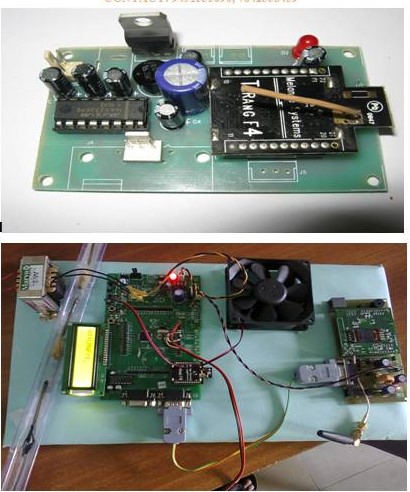

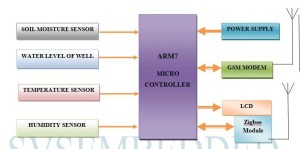
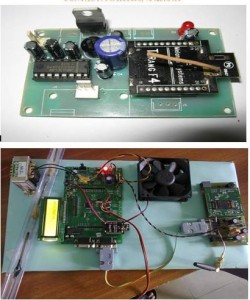


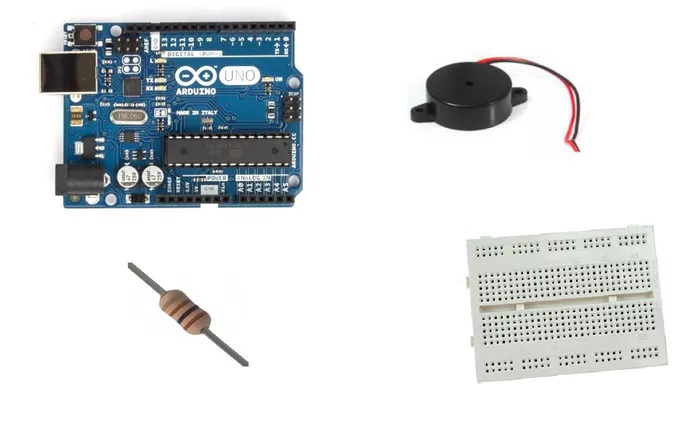
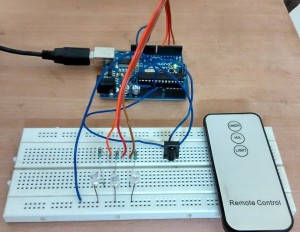

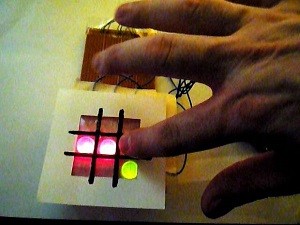
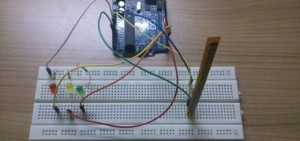
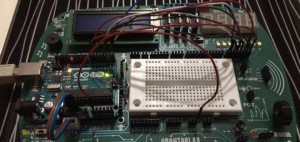
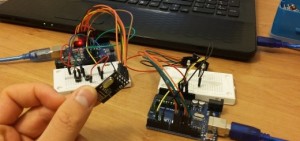
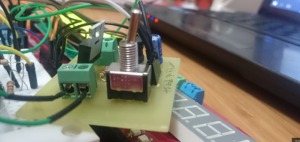
Post Comment
You must be logged in to post a comment.